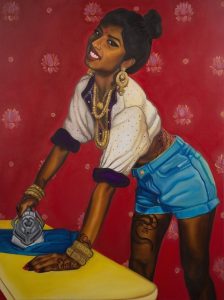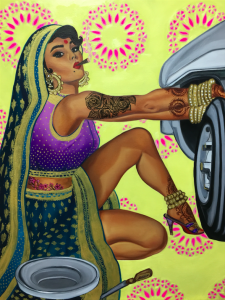
A Link Roundup of Body Politics, Body Image & Body Justice News
Justice
- Tunisia’s black community says racism is commonplace in the country today. In this village, children of different skin colour travel on separate buses. Locals say this is to prevent mixed marriages. But not all Tunisians would agree. Five years on from the revolution, the country’s large black minority – roughly about 15 percent of the population – say they have yet to fully experience the freedoms that their fellow citizens enjoy. They say that racial abuse and discrimination are still widespread in a society that is supposed to have done away with inequity and prejudice, and that the authorities are failing to take action.
- “Canvassing has long been used as a means to spread political messages among voters. … But when it comes to transgender issues, a groundbreaking new study has found that door-to-door outreach can profoundly change people’s perspectives over the long-term when conducted by a trans person themselves or a community ally. Rather than delivering a short script to voters, deep canvassing focuses on longer, 10- to 15-minute interactions that center around personal stories (see the video).”
Identity
- A December 2015 study in the Journal of Bisexuality found that gays and lesbians had nearly identical prejudice against bisexuals as heterosexuals.1 But most bisexuals don’t need a study to affirm that fact, and failure to acknowledge biphobia from within and outside LGBT communities is extremely harmful. Failure to acknowledge and address biphobia has had a powerful impact on bisexual health, forcing our risk factors to skyrocket past those of gay and lesbian people. Nearly half of bisexual women have considered or attempted suicide.2 They have higher rates of mood disorders, such as depression and anxiety, compared to lesbians or heterosexual women.3 One in two bisexual women has experienced severe violence by an intimate partner as opposed to one in three lesbians and one in four heterosexual women.4 Bisexual women are more than twice as likely to live in poverty as lesbians,5 are less likely to be out to their doctors,6 and are more likely to smoke and have substance abuse issues.7″
- “Recently, a 12-year-old student from Fort Bend County, Texas was called a terrorist by his teacher in front of his classmates.“We were in the class watching a movie,” the student said, “And I was just laughing at the movie and the teacher said, I wouldn’t be laughing if I was you.’ And I said why? She said, ‘Because we all think you’re a terrorist.” He was then ridiculed by his peers after the teacher made the horrifying remarks. Thankfully the teacher was removed and the incident is being investigated.” Ayakhalil talks about her experiences as a student around being a Muslim in school and gives tips for educators and for. everyone really, on how to create safer spaces for Muslim students. – Muslimgirl.com
Sex Positivity
- Andres Morris-Gurza breaks down 5 Reasons Why We Need Disabled, Queer Male Porn Performers. ” I can remember the very first time I ever watched a gay porn scene. …As I watched, while I became completely intoxicated by this scene, because it cemented that I definitely had a predilection for the peen, something else was happening to me too — something deeper and more affecting than I understood at the time. I was learning about our culture. I was learning about the performance of masculinity, and that to be a real gay man you had to look and act a certain way in order to be accepted. As I watched these two men switch positions with ease and comfort, as if it were nothing to do this, barely saying anything to one another, but totally understanding what was to happen next, I understood that my body wasn’t good enough.”
Body Image
- Asian American Women talk about their experiences with body image. According to a 2007 UCLA study Asian women reported lower satisfaction with their bodies than women of African, European, or Hispanic backgrounds. Check out the video here.
- Cocoa swatches is a new makeup website/service that curates makeup for medium to dark complexions. Brown and dark skinned women are underrepresented in the beauty industry. Makeup made for diverse skin tones are not made, or when made – not available or widely distributed by even the most well known brands. The site seeks to center those products for women of color to find them.
- American Eagle got called out for treating the idea of men’s plus size modeling as a joke when they revealed that a recent video featuring “four male models of various sizes talking about body image and retouching, was an April Fool’s Day joke. Really!? “Unfortunately, the now-viral ‘parody’ highlights a double standard which assumes that women need body-positivity more than men. This assumption is based on nothing more than archaic masculine ideals which argue that insecurity and any display of excess emotion more generally are ‘feminine’ traits. According to one 2014 study, almost 18 percent of teenage boys are concerned about their bodies, while in the USA, 10 million men will reportedly suffer from a significant eating disorder in their lifetimes.” – Dazed Digital

Art/Media
- Buzzfeed features the glorious artwork of Nimisha Bhanot and in and her pinup series that portrays Indian women (accurately) as sexually liberated badasses. ‘Nimisha Bhanot had the idea in 2012, when she was in art school and she heard about the gang rape and murder of Jyoti Singh. “… I was very angered that there were people out there blaming her for getting raped because she was out at night.”‘ The series Badass Bahus, is also featured which confronts expectations from Indian women as housewives. The women in her paintings have a strong gaze. “Looking back and talking back are considered very unlady-like and heavily discouraged in our community,” she says.
- Personally, Fortune magazine is generally not on my radar. However a capitalist financial magazine taking positive note of a social justice movement lead by Black queer women, that’s pretty notable…. Alicia Garza, Patrisse Cullors and Opal Tometi the women who created the Black Lives Matter movement have made the Fortune 50 World’s Greatest Leaders List of 2016. “the Black Lives Matter network, which has grown to 28 local chapters, each fighting a range of racial injustices like police brutality and racial profiling. Last year the movement inspired college students to take up the mantel, with some successes (the system president and chancellor of the University of Missouri resigned over outcry they failed to address campus racism). They also pushed the presidential candidates to address the country’s systemic racism – an issue would-be nominees would probably have preferred to sidestep.”